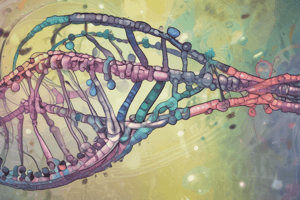Podcast
Questions and Answers
What is the usual chromosome that the extra full or partial copy of chromosome 21 attaches to in translocation?
What is the usual chromosome that the extra full or partial copy of chromosome 21 attaches to in translocation?
- Chromosome 21
- Chromosome X
- Chromosome 14 (correct)
- Chromosome 18
What is the percentage of Down syndrome cases caused by translocation?
What is the percentage of Down syndrome cases caused by translocation?
- 3% (correct)
- 10%
- 1%
- 5%
How many Filipino households are caring for a family member with Down syndrome?
How many Filipino households are caring for a family member with Down syndrome?
- Over 500,000
- Over 50,000
- Over 200,000
- Over 100,000 (correct)
What is the approximate frequency of Down syndrome in newborns in the Philippines?
What is the approximate frequency of Down syndrome in newborns in the Philippines?
What is the total number of chromosomes in the cells of individuals with translocation Down syndrome?
What is the total number of chromosomes in the cells of individuals with translocation Down syndrome?
Flashcards are hidden until you start studying
Study Notes
Chromosomal Abnormalities
- Chromosomal abnormalities occur when a child inherits too many or too few chromosomes, resulting in a genetic condition due to a problem with one of the 23 pairs of chromosomes.
Causes of Chromosomal Abnormalities
- Age of the mother
- Genetic mutations
- Inherited abnormalities
- Environmental factors
Trisomy 21 (Down Syndrome)
- Also known as Down syndrome, it is one of the most common chromosomal abnormalities.
- Caused by abnormal cell division resulting in an extra full or partial copy of chromosome 21.
- Characterized by intellectual disability and physical features such as short fingers and toes, folds of skin over the eyes, and a protruding tongue.
Prevalence of Down Syndrome
- In Illinois, there is a prevalence of Down syndrome (refer to Table 2.2).
- In the Philippines, Down syndrome affects approximately one in every 800 newborns, with over 100,000 Filipino households caring for a family member with this condition.
Types of Down Syndrome
- Trisomy 21 (Nondisjunction): an error in cell division resulting in an embryo with three copies of chromosome 21 instead of the usual two.
- Mosaicism: a mixture of two types of cells, some containing 46 chromosomes and some containing 47, with an extra chromosome 21.
- Translocation: the total number of chromosomes remains 46, but an additional full or partial copy of chromosome 21 attaches to another chromosome, usually chromosome 14.
Studying That Suits You
Use AI to generate personalized quizzes and flashcards to suit your learning preferences.




